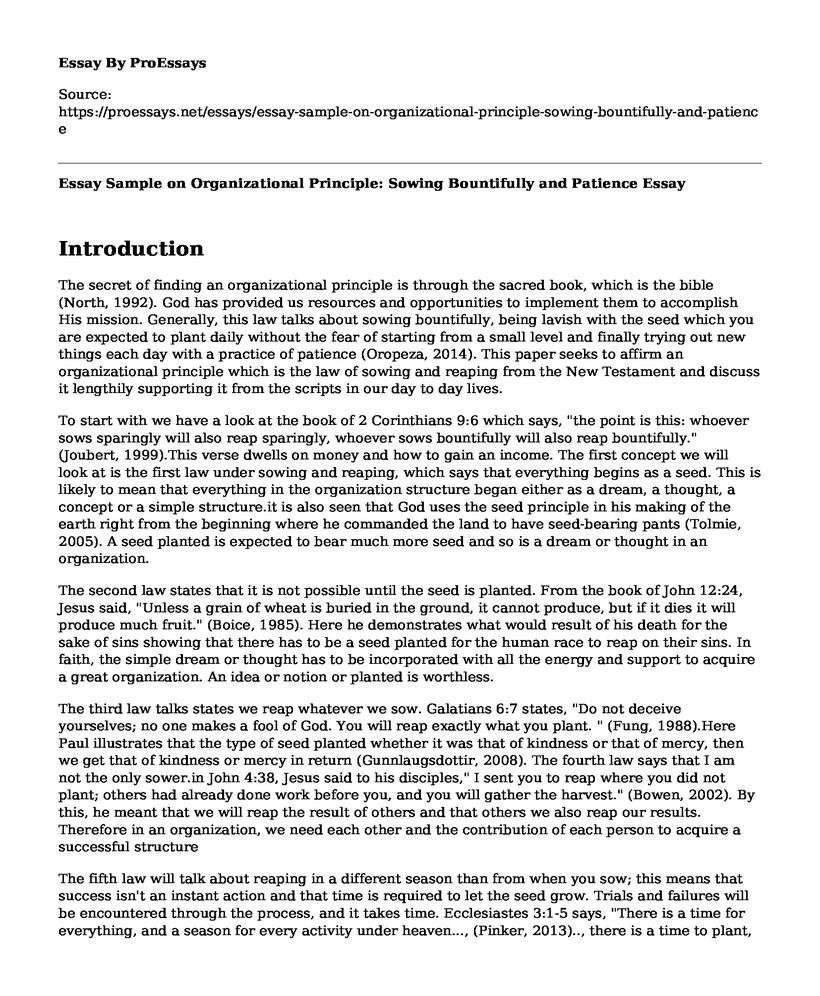Introduction
The secret of finding an organizational principle is through the sacred book, which is the bible (North, 1992). God has provided us resources and opportunities to implement them to accomplish His mission. Generally, this law talks about sowing bountifully, being lavish with the seed which you are expected to plant daily without the fear of starting from a small level and finally trying out new things each day with a practice of patience (Oropeza, 2014). This paper seeks to affirm an organizational principle which is the law of sowing and reaping from the New Testament and discuss it lengthily supporting it from the scripts in our day to day lives.
To start with we have a look at the book of 2 Corinthians 9:6 which says, "the point is this: whoever sows sparingly will also reap sparingly, whoever sows bountifully will also reap bountifully." (Joubert, 1999).This verse dwells on money and how to gain an income. The first concept we will look at is the first law under sowing and reaping, which says that everything begins as a seed. This is likely to mean that everything in the organization structure began either as a dream, a thought, a concept or a simple structure.it is also seen that God uses the seed principle in his making of the earth right from the beginning where he commanded the land to have seed-bearing pants (Tolmie, 2005). A seed planted is expected to bear much more seed and so is a dream or thought in an organization.
The second law states that it is not possible until the seed is planted. From the book of John 12:24, Jesus said, "Unless a grain of wheat is buried in the ground, it cannot produce, but if it dies it will produce much fruit." (Boice, 1985). Here he demonstrates what would result of his death for the sake of sins showing that there has to be a seed planted for the human race to reap on their sins. In faith, the simple dream or thought has to be incorporated with all the energy and support to acquire a great organization. An idea or notion or planted is worthless.
The third law talks states we reap whatever we sow. Galatians 6:7 states, "Do not deceive yourselves; no one makes a fool of God. You will reap exactly what you plant. " (Fung, 1988).Here Paul illustrates that the type of seed planted whether it was that of kindness or that of mercy, then we get that of kindness or mercy in return (Gunnlaugsdottir, 2008). The fourth law says that I am not the only sower.in John 4:38, Jesus said to his disciples," I sent you to reap where you did not plant; others had already done work before you, and you will gather the harvest." (Bowen, 2002). By this, he meant that we will reap the result of others and that others we also reap our results. Therefore in an organization, we need each other and the contribution of each person to acquire a successful structure
The fifth law will talk about reaping in a different season than from when you sow; this means that success isn't an instant action and that time is required to let the seed grow. Trials and failures will be encountered through the process, and it takes time. Ecclesiastes 3:1-5 says, "There is a time for everything, and a season for every activity under heaven..., (Pinker, 2013).., there is a time to plant, and there is a time to harvest...a time to scatter, there is a time to gather...a time to sow and a time to reap..." (Hyman, 2003).
Conclusion
In business, we ought to carefully select our aim of what we want to sow and then incorporate the projects which are the seeds until the right time comes for the harvest. If we give up on the projects early and hardly give them time to establish, then we reap no benefits and no success
References
Boice, J. M. (1985). Gospel of John. Zondervan Publishing Company. Retrieved from: https://tobh.pw/ogoe.pdf
Bowen, J. P. (2002). Coming to Faith in the Gospel of John. ANVIL-BRISTOL-, 19(4), 277-284. Retrieved from: https://biblicalstudies.org.uk/pdf/anvil/19-4_277.pdf
Fung, R. Y. (1988). The epistle to the Galatians (Vol. 9). Wm. B. Eerdmans Publishing. Retrieved from: https://books.google.co.ke/books?hl=en&lr=&id=THYUsu7sLGEC&oi=fnd&pg=PR9&dq=Fung,+R.+Y.+(1988).+The+epistle+to+the+Galatians+(Vol.+9).+Wm.+B.+Eerdmans+Publishing.&ots=ykpWpVsOPl&sig=ISef3yaKR9eS6P6yNukT7eve33M&redir_esc=y#v=onepage&q&f=false
Gunnlaugsdottir, J. (2008). As you sow, so you will reap: implementing ERMS. Records Management Journal, 18(1), 21-39. Retrieved from: https://www.emerald.com/insight/content/doi/10.1108/09565690810858497/full/html
Hyman, R. T. (2003). Two Fundamental Word-Pairs: Sow/Reap and Plow/Reap. Jewish Bible Quarterly, 31(4), 237-244. Retrieved from: https://jbq.jewishbible.org/assets/Uploads/314/314_Sowreap2.pdf
Joubert, S. (1999). Religious reciprocity in 2 Corinthians 9: 6-15: Generosity and gratitude as legitimate responses to the kharis toy theoy. Neotestamentica, 79-90. Retrieved from: https://www.jstor.org/stable/43048359?seq=1#page_scan_tab_contents
North, J. L. (1992). Sowing and Reaping (Galatians 6: 7b): More Examples of a Classical Maxim. The Journal of Theological Studies, 43(2), 523-527. Retrieved from: https://www.jstor.org/stable/23963903?seq=1#page_scan_tab_contents
Oropeza, B. J. (2014). The Expectation of Grace: Paul on Benefaction and the Corinthians' Ingratitude (2 Corinthians 6: 1). Bulletin for Biblical Research, 207-226. Retrieved from: https://www.jstor.org/stable/26371144?seq=1#page_scan_tab_contents
Pinker, A. (2013). Ecclesiastes Part II: Themes. Jewish Bible Quarterly, 41(3), 163. Retrieved from: https://www.questia.com/library/journal/1G1-334379854/ecclesiastes-part-ii-themes
Tolmie, D. F. (2005). Persuading the Galatians: A text-centred rhetorical analysis of a Pauline letter (Vol. 190). Mohr Siebeck. Retrieved from: https://books.google.co.ke/books?hl=en&lr=&id=fHLT9wCuLbsC&oi=fnd&pg=PR9&dq=Tolmie,+D.+F.+(2005).+Persuading+the+Galatians:+A+text-centred+rhetorical+analysis+of+a+Pauline+letter+(Vol.+190).+Mohr+Siebeck.+&ots=ZIaj_mqDU5&sig=o2qZeqzD6Eh5QA_iR0RSsKS_4nI&redir_esc=y#v=onepage&q&f=false
Cite this page
Essay Sample on Organizational Principle: Sowing Bountifully and Patience. (2023, Feb 12). Retrieved from https://proessays.net/essays/essay-sample-on-organizational-principle-sowing-bountifully-and-patience
If you are the original author of this essay and no longer wish to have it published on the ProEssays website, please click below to request its removal:
- Sports Consumption Essay Example
- Situational Analysis for the Cocoa Delights Organization
- Essay Sample on Digital Marketing vs Traditional Marketing
- High Competition in Current Market - Essay Sample
- Organizational Change: Strategies to Overcome Challenges - Essay Sample
- Essay Example on Coca-Cola Advertisement
- Convenience Store Responsiveness: Strategies for Market Dominance - Essay Sample







